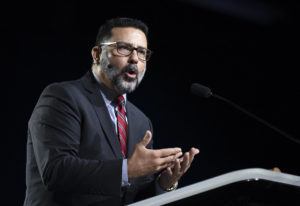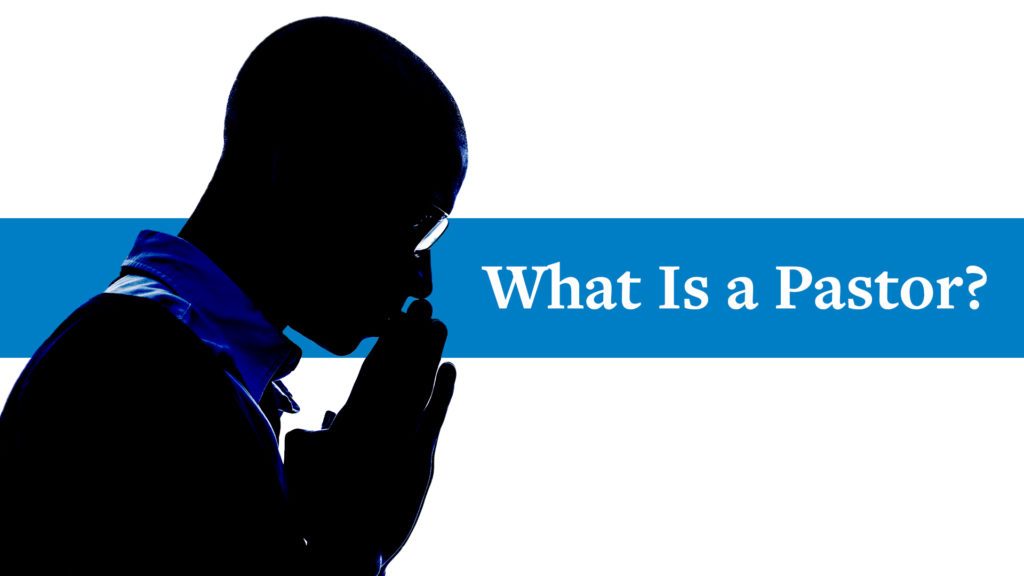
Perhaps you’ve heard about the little boy who leaned over after the Sunday sermon to tell his mother, “I’ve decided to become a pastor when I grow up.”
“You have? Why did you decide that?” she asked.
“Well, I figure it’s more fun to stand up there and yell than it is to sit here and listen,” he replied.
For some, being a pastor is preaching a Sunday sermon. While a weekly message plays an important role, it is only the tip of the iceberg in pastoral ministry.
We talked to eight pastors and theologians about the work of a pastor in a local church.
Pointing to texts such as Acts 20:28-35, Ephesians 4:11-16, 1 Timothy 3:1-7, 1 Timothy 5:17-19, Titus 1:5-9, Hebrews 13:7-17, and 1 Peter 5:1-5, they talked about the need for clarity and the extensive responsibilities that come with the role of a pastor.
As they discussed the biblical words such as elder, overseer, and shepherd, which they believe all point to one office in the local church, the men also fleshed out the practical applications of leading, feeding, and protecting the flock.
“Paul told elders from the Church at Ephesus to oversee and shepherd their flocks,” said Steve Gaines, senior pastor of Bellevue Baptist Church in Memphis.
Gaines was a member of the committee that drafted the Baptist Faith and Message 2000. The statement of faith adopted by messengers to the 2000 SBC Annual Meeting says that pastor and deacon are the two biblical offices of the local church.
“According to Scripture, a pastor leads the church primarily through preaching the Scriptures and by equipping and leading church members to minister to one another and to share the Gospel of Jesus Christ with non-Christians in order to win them to faith in Jesus,” Gaines said.
Jonathan Leeman, an elder at Cheverly Baptist Church in Bladensburg, Maryland, and editorial director for 9Marks, a parachurch organization focused on what it deems are the biblical marks of a healthy church, agrees and says of a pastor, “He’s a man authorized by God, affirmed by the congregation, to lead the congregation in the way of Christ through preaching, prayer, and general oversight.”
Leeman says it is the call to preach and lead that sets a pastor apart from the deacons in the church.
“If we’re drawing from Acts 6, they [pastors] have the responsibility for the preaching of the Word and general oversight of the church,” Leeman said. “Whereas, deacons have responsibility in that text for bringing unity to the church by addressing tangible needs and supporting the ministry of the pastors.”
Darryl Jones, senior pastor of The Rock Fellowship in Pembroke Pines, Florida, says protecting the flock from false teaching is an important part of the work he feels called to pursue as a pastor.
“Teach them the Word of God. Praying for them. Teaching them spiritually and protecting them from false teachers and false doctrine,” he said.
This can prove to be a challenge in the information age. How can a pastor’s voice be heard by the sheep in an age when there are so many competing voices?
This isn’t a new question for God’s people. God has been caring for sheep for centuries. In fact, He is often heartbroken when His sheep are left to scatter.
God rebukes the “shepherds of Israel” in Ezekiel 34:1-6 when they do not care for the people of God. Jesus says He is the Good Shepherd in John 10:1-18 whose voice is recognized by the sheep.
The similarities between shepherds and pastors are brought to a crescendo in 1 Peter 5 when pastors are charged to shepherd the flock in 1 Peter 5:2, and in 1 Peter 5:4 they are reminded that the Chief Shepherd will appear. Scholars believe the Chief Shepherd to be, quite obviously, Jesus.
But sheep play a role in this shepherding. They must be willing to be shepherded.
That can be tough to achieve within churches that value not only the autonomy of the local church, but the personal freedoms of each believer.
The BF&M says, “Each congregation operates under the Lordship of Christ through democratic processes.” Further, it affirms the individual responsibility of each believer: “In such a congregation each member is responsible and accountable to Christ as Lord.”
Gregory A. Wills, dean of the School of Theology at Southwestern Baptist Theological Seminary, thinks about Hebrews 13:17 as he considers “the leadership or governing function” by which Christ calls the pastor to keep watch over the souls that have been placed in his care.
In that text, the author says pastors are “keeping watch” over the souls they lead. It is a sobering thought when considering the significant spiritual role a pastor should play in the life of a church member.
Thinking about Hebrews 13:17, a Crossway commentary records John Owen writing, “The work of these leaders is solely to take care of your souls: to keep them from evil, sin, and backsliding; to instruct them and feed them; to encourage their obedience and faith, and so lead them safely to eternal rest.”

At High Pointe Baptist Church in Austin, Texas, Juan Sanchez says that is what he is trying to do.
“Essentially, what a pastor does is feed the flock and protect the flock. So, the image is that of the shepherd . . . to lead the sheep to green pastures and to protect them from wolves,” he said.
He looks to Ephesians 4:11-16 when he considers how a pastor-shepherd moves God’s people to fresh waters and fends off those who would try to harm them.
“What pastors do is they equip the saints for the work of ministry by preaching the Word, teaching the Word, and that’s how they both feed the church and protect the church,” he said.
Mark Vance, at Cornerstone Church in Ames, Iowa, is working, ultimately, to accomplish the same purpose.
Vance says he aims at four primary responsibilities in pastoral work: preaching and teaching the Word, shepherding or caring for God’s people, stewardship of the resources of the church, and being an example to the flock.
He says pastors should be careful to hear the call of 1 Peter 5:1-5 and remember to focus on what the pastor looks like, not just what he does.
“I would also appeal if you want to see what the pastor looks like, we have not just text but we have context and historical examples,” Vance said. “What did Jesus’ apostles look like? What did the spiritual leadership look like in the book of Acts? Who are the men listed there?”
He believes that while the New Testament features the characteristics of the pastor, there are important pictures of what it looks like to shepherd well.
“We have the exemplary text of the storyline of the New Testament and the development of how spiritual leadership looks in the early church,” Vance said.
Because of the authority given to him, a pastor’s character is of primary importance, said Hershael York, longtime senior pastor of Buck Run Baptist Church in Frankfort, Kentucky.
“When you think about someone who is a fantastic Sunday School teacher but they would not be a fantastic pastor, it comes down to authority,” said York, who is the dean of the School of Theology at Southern Baptist Theological Seminary.
He sees authority shine through the role of pastor, whether the shepherd is delivering the Sunday message or interacting with church members throughout the week, and likens it to the authority a parent should have in a child’s life.
“There’s a difference when my neighbor sees one of my kids doing something they shouldn’t be doing and tells them to stop and when I tell them that I’m going to discipline them if they don’t stop,” he said. “The difference is authority.
“Like that, a Sunday School teacher would be someone that teaches the Word of God, but they don’t have the authority in the sense of reproving, rebuking, exhorting that a pastor does. But a pastor standing in the pulpit opening the Word of God . . . there is authority.”
And it’s not just in the minutes when the preacher is preaching. The pastor’s spiritual authority should extend when he’s meeting people one on one or leading in a smaller setting.
“The pastor has the right and responsibility to go to people and instruct them and correct them,” York said. “If someone falls into sin, the pastor has the responsibility to call them to repentance. Hopefully they will repent, but if not, then the pastor is to take the next steps of discipline in the church.”
North Carolina church planter Quintell Hill believes that calling remains the same no matter the context. “I’ve thought a lot about this question. If you shepherd the flock of God, the methodology may be different, but the task is the same. We don’t deviate from the Book [Bible],” he said.
















